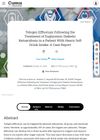 2 citations,
March 2021 in “bioRxiv (Cold Spring Harbor Laboratory)”
2 citations,
March 2021 in “bioRxiv (Cold Spring Harbor Laboratory)” Hairless mammals have genetic changes in both their protein-coding and regulatory sequences related to hair.
 27 citations,
March 1994 in “Harvard Review of Psychiatry”
27 citations,
March 1994 in “Harvard Review of Psychiatry” Behavior therapy and medications, especially clomipramine, can help reduce hair pulling in people with trichotillomania.
 58 citations,
January 2018 in “International Journal of Women's Dermatology”
58 citations,
January 2018 in “International Journal of Women's Dermatology” Alopecia significantly lowers women's quality of life, with psychological and social challenges, highlighting the importance of early treatment and support.

Hair loss can occur after treating diabetic ketoacidosis, especially with rapid weight loss and high soft drink intake.
 October 2023 in “Scientific Reports”
October 2023 in “Scientific Reports” Oxytocin may help hair grow by increasing hair growth-related genes and factors.
 11 citations,
January 2022 in “Journal der Deutschen Dermatologischen Gesellschaft”
11 citations,
January 2022 in “Journal der Deutschen Dermatologischen Gesellschaft” Alopecia areata is a chronic condition causing hair loss, with new treatments targeting the immune system showing promise.
 February 2024 in “Scientific Reports”
February 2024 in “Scientific Reports” Cinnamic acid may help hair grow by activating oxytocin receptors.
 January 2024 in “Biological Research”
January 2024 in “Biological Research” Tiny particles from stem cells can help protect ear cells from antibiotic damage by helping cells remove damaged parts.
June 2023 in “International journal of molecular sciences” Heat stress changes goats' skin and hair at the microscopic level and affects their genes and skin bacteria.
 May 2014 in “Hair transplant forum international”
May 2014 in “Hair transplant forum international” Scalp tools, tracking progress, targeting scalp inflammation, and avoiding certain hair treatments can improve female hair loss treatment.
6 citations,
June 2021 in “EClinicalMedicine” ALRV5XR significantly improves hair density in women with hair loss and is well-tolerated.
5 citations,
February 2021 in “Gels” HYDRO DELUXE BIO hyaluronic acid hydrogel is compatible with skin cells, may reduce inflammation, promote blood vessel growth, and protect against oxidative stress, suggesting it could help revitalize hair follicles.
2 citations,
January 2022 in “Anais brasileiros de dermatologia/Anais Brasileiros de Dermatologia” Chemical hair straighteners can cause scalp and hair damage, but long-term effects are unclear.
 1 citations,
February 2017 in “MOJ bioequivalence & bioavailability”
1 citations,
February 2017 in “MOJ bioequivalence & bioavailability” Treating hair loss effectively may require a multi-sided approach, using different treatments together, and topical treatments could be more effective and safer than oral ones.
Whale oil significantly promotes hair growth and may be a safe, effective alternative to minoxidil.

TLR2 helps control hair growth and regeneration, and its reduction with age or obesity can impair hair growth.
 June 2023 in “Current Issues in Molecular Biology”
June 2023 in “Current Issues in Molecular Biology” DN106212, an extract from a plant, is better at promoting hair growth than other tested substances by affecting hair growth factors and follicle development.
 June 2022 in “Frontiers in Medicine”
June 2022 in “Frontiers in Medicine” Acupuncture and moxibustion may help treat hair loss, but more research is needed.
 May 2021 in “The Journal of clinical and aesthetic dermatology”
May 2021 in “The Journal of clinical and aesthetic dermatology” Most women with hair loss using 5% topical Minoxidil are satisfied with the treatment, but hair loss still affects their daily habits and social life.
 56 citations,
August 2019 in “Clinical, Cosmetic and Investigational Dermatology”
56 citations,
August 2019 in “Clinical, Cosmetic and Investigational Dermatology” The document concludes that Telogen Effluvium is a hair loss disorder that can be assessed with the modified wash test and may be treated with clobetasol foam, with patient management being important.
 23 citations,
August 2018 in “Anais Brasileiros De Dermatologia”
23 citations,
August 2018 in “Anais Brasileiros De Dermatologia” Both androgenetic alopecia and alopecia areata negatively impact quality of life, with no significant difference between them.
 22 citations,
April 2020 in “Scientific reports”
22 citations,
April 2020 in “Scientific reports” Changthangi goats have specific genes that help produce Pashmina wool.
 5 citations,
December 2021 in “Frontiers in Cell and Developmental Biology”
5 citations,
December 2021 in “Frontiers in Cell and Developmental Biology” Enzymes called PADIs play a key role in hair growth and loss.
 4 citations,
October 2022 in “Genes”
4 citations,
October 2022 in “Genes” Our microbiome may affect the development of the hair loss condition Alopecia Areata, but more research is needed to understand this relationship.
 October 2023 in “Biomaterials”
October 2023 in “Biomaterials” Nanotechnology could improve hair regrowth but faces challenges like complexity and safety concerns.
 June 2023 in “Food frontiers”
June 2023 in “Food frontiers” Ginsenoside CK, found in Panax ginseng, can prevent hair loss by controlling certain growth pathways and promoting hair follicle development.
 122 citations,
November 1984 in “Journal of the American Academy of Dermatology”
122 citations,
November 1984 in “Journal of the American Academy of Dermatology” No single treatment is consistently effective for alopecia areata, and more research is needed.
 39 citations,
August 2021 in “JAAD International”
39 citations,
August 2021 in “JAAD International” COVID-19 patients often experience hair loss and scalp pain, which may be related to the severity of their infection and treatment drugs.
 4 citations,
February 2022 in “Experimental Dermatology”
4 citations,
February 2022 in “Experimental Dermatology” Hair loss in men might be linked to changes in cell energy factories.
1 citations,
February 2024 in “Diversity” African plants can treat hair issues and may help with diabetes.
























